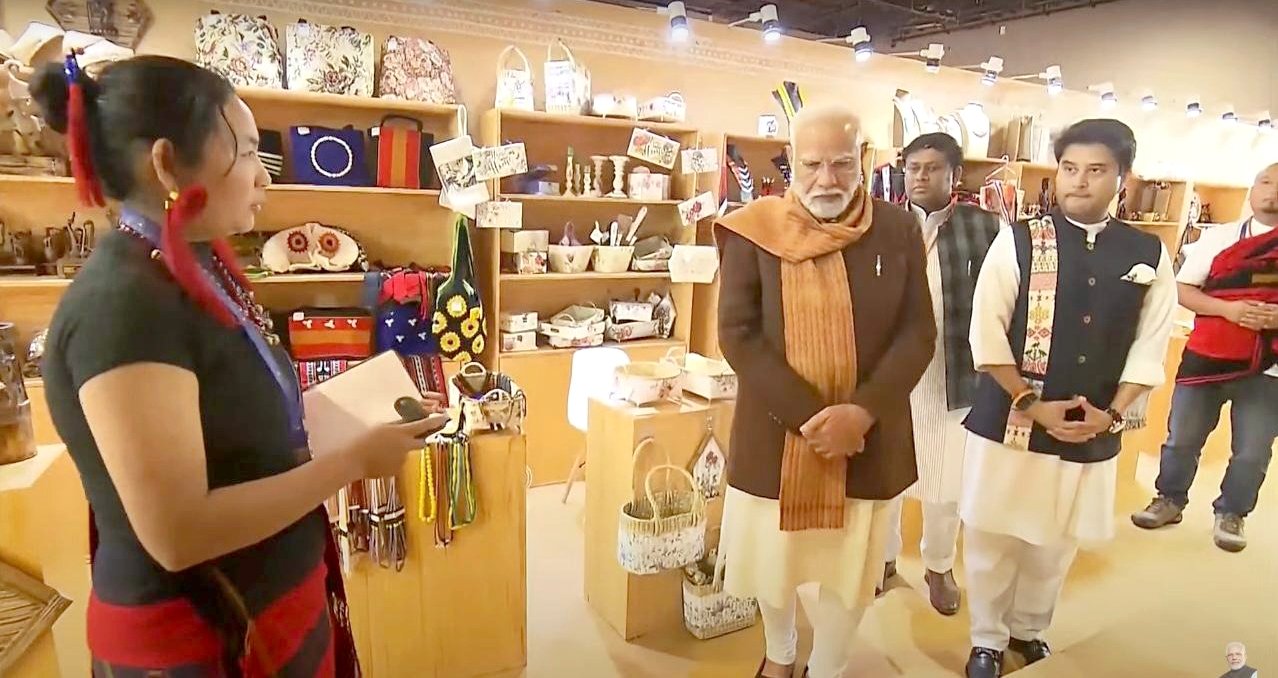For 39-year-old Imtisunup Longchar, entrepreneurship was never about a specific product—it was about the drive to create something of his own
Share
DIMAPUR — For 39-year-old Imtisunup Longchar, entrepreneurship was never about a
specific product—it was about the drive to create something of his own.
Adventurous and always eager to explore, he was equally passionate about his
land, culture, and the unique local products that tell its story. This blend of
innovation and tradition led him to co-found ilandlo.com, an e-commerce
platform connecting local products to a global market.

With a background in computer science and over six years of experience in patents and trademarks at UnitedLex, Gurugram, he took the unconventional route, launching his business a decade ago. His efforts in promoting local entrepreneurs have earned recognition, with ilandlo.com winning the 2022 Startup Nagaland competition, being nominated for the NEEDP program, and an investment nomination from the NEDFi venture fund.
In this interview with Eastern Mirror, Longchar shares insights into his entrepreneurial journey, the challenges of e-commerce in the region, and advice for aspiring entrepreneurs looking to enter the online retail sector.
Could you walk us through the journey of founding ilandlo and what initially sparked the idea?
The journey of founding ilandlo began with the recognition of a significant gap in the market: products made in Nagaland were not easily accessible outside the region, and people from other areas struggled to find and purchase them. This challenge sparked the idea to create a platform that would bridge the gap between local artisans and global consumers.
Our mission was to make Nagaland's crafts, food, handloom, and rich cultural heritage more accessible to a wider audience. To address this, we first launched an e-commerce website in 2014, followed by the opening of our flagship store in Dimapur in 2020. Additionally, we integrated a logistics platform to support local businesses, enabling them to expand their reach and connect with customers beyond the state.

What unique challenges does e-retailing present in Nagaland and the wider Northeast region?
E-retailing in the Northeast, particularly Nagaland, faces significant logistical hurdles. While metropolitan areas enjoy rapid delivery services at competitive prices, the region grapples with poor connectivity, challenging road infrastructure, and limited courier options. This translates to increased shipping costs and extended delivery times, potentially exceeding the product cost itself, thereby impacting customer satisfaction and sales. Furthermore, a lack of trust in online payment systems remains prevalent, with many customers preferring cash on delivery due to concerns about online fraud, particularly for new or lesser-known brands.


What challenges do you face when it comes to logistics and shipping from Nagaland to other parts of the country?
Shipping goods from Nagaland to other parts of
India presents significant logistical challenges. Limited courier service
providers and a lack of competition result in high shipping costs, exacerbated
by expensive fuel surcharges. Deliveries often experience significant delays
(5-10 days or more) due to indirect routes, poor road infrastructure, and
frequent weather disruptions. Reverse logistics, crucial for returns and
exchanges, remains costly and unreliable with limited pickup options. Moreover,
packaging challenges arise for fragile or perishable goods, while some couriers
may reject liquids or handcrafted items. Tracking is often inaccurate, and
last-mile delivery struggles due to remote locations impacting customer
satisfaction and overall business efficiency.
Could you share advice for students interested in pursuing a career in e-commerce?
Don’t do it just because everyone is doing it. Take time in your market research, identify the right product and work on a strong branding and marketing strategy. Businesses fail because they rush in without understanding customer needs, trends, or the competition. Entering the market with the right product at the right time can give you an edge, but it takes careful planning and strategy.

What role do online marketplaces play in your business, and how can new entrepreneurs leverage these platforms?
A significant advantage of online selling lies in the leverage provided by established marketplaces like Amazon and Flipkart. These platforms offer pre-existing customer bases, secure payment gateways, and robust logistics infrastructure, enabling businesses to reach wider audiences without substantial upfront investment in their own e-commerce infrastructure.
By leveraging these platforms, we have significantly expanded our reach, increased sales, and enhanced customer trust by utilising established systems. Diversification across multiple marketplaces, coupled with a thorough understanding of each platform's policies, have further optimised our growth and profitability.
For emerging entrepreneurs, these marketplaces offer a valuable opportunity to establish an online presence and generate revenue with minimal initial investment. By adhering to platform policies and leveraging existing infrastructure, one can effectively capitalise on the potential of online sales while minimising the operational and financial burdens associated with building their own e-commerce platforms from the ground up. You can start with just one product. There are many who just do dropshipping and reselling to generate high incomes without even stocking inventory. My partner started selling on eBay during her college days, sourcing clothes from New Market in Dimapur. If you want to, you can.
In terms of education, which courses do you recommend for students aiming to enter the e-retail sector?
As an e-commerce entrepreneur, one of the most important factors is one’s curiosity to learn, adapt to the ever-changing e-commerce landscape and possess a unique blend of skills and traits. Honestly, these don’t come with a formal degree. The internet itself is an ocean of knowledge where there are no limitations to learn. Digital marketing, business administration, logistics and supply chain management and web development are some of the fields to pursue. One can work on building excellent communication and interpersonal skills to build relationships and gain practical experience by interning with e-commerce companies. Most importantly, by prioritising sound financial management principles, e-commerce entrepreneurs can build a strong foundation for sustainable growth and long-term success in the competitive online marketplace.
Could you discuss any challenges in branding and promoting products from regions such as Nagaland?
Effectively branding and promoting products from regions like Nagaland presents unique challenges. As a niche player in a vast market with diverse product segments, ilandlo necessitates a multi-channel marketing strategy tailored to distinct target audiences. Maintaining brand consistency while managing multiple campaigns, effectively allocating budgets and resources, and accurately tracking campaign performance for each audience segment can be complex. A one-size-fits-all approach is insufficient in this context, demanding a nuanced and targeted approach to reach and engage diverse consumer groups.
How does ilandlo balance online presence with physical stores, and what lessons can students learn from that model?
A cornerstone of ilandlo’s omnichannel strategy is maintaining consistent branding, pricing, and customer service across all channels. This ensures a unified customer experience, regardless of whether they engage with us online or in-store. Accurate and real-time inventory management is critical, enabling seamless stock availability across all channels, preventing stockouts, and ensuring efficient order fulfillment. We leverage social media and search engine optimisation (SEO) to drive traffic to both our online and physical stores.
An omnichannel model provides valuable lessons for students. By analysing customer interactions across various touchpoints, they can gain a deeper understanding of customer behaviour, preferences, and expectations. This knowledge empowers businesses to optimise their marketing strategies for maximum impact, fostering consistent experiences and building strong customer relationships.
What are some common mistakes that first-time e-commerce entrepreneurs make, and how can they avoid them?
A common misstep for first-time e-commerce entrepreneurs is the assumption that simply establishing an online presence will automatically generate sales. This often leads to neglecting crucial aspects like search engine optimisation (SEO) and targeted marketing. Overspending on inventory, particularly in the early stages, can also strain cash flow. We learnt this firsthand. Selling online requires a multi-faceted approach. Convincing customers to purchase products they cannot physically touch or examine necessitates a strong online presence and consistent marketing efforts.
Effective market research is paramount to identify the right target audience and tailor marketing strategies accordingly. Furthermore, prudent resource allocation is crucial for long-term sustainability. Recycling packaging materials in the early stages, for example, demonstrates the importance of cost-effective strategies and judicious spending.
How do you see e-commerce in Nagaland evolving over the next few years?
With the improvement in internet service, logistics network and the necessity of businesses to have their online presence, e-commerce will only grow bigger. Of course the competition will be more but also the focus on promoting local products will have a bigger impact and reach while increasing the income of our farmers and artisans and the overall development of the region.
What are the pros and cons of selling on established marketplaces versus your own website?
The advantages of selling on established marketplaces often mirror the limitations of operating an independent online store. Platforms like Amazon enjoy significant customer trust, which can positively impact the perceived credibility of brands like ilandlo. Furthermore, these marketplaces provide access to a vast customer base, enabling businesses to reach a wider audience with minimal upfront marketing investment. The robust analytics and reporting features offered by these platforms streamline data collection and analysis, eliminating the need for extensive website setup and data tracking infrastructure.
However, selling on large marketplaces also presents challenges. Intense competition from numerous sellers and a vast product catalogue can make it difficult for individual products to stand out. Moreover, sellers have limited control over their brand presentation, customer relationships, and overall business strategy on these platforms. This dependence on third-party platforms carries inherent risks, as the long-term viability of the platform and the potential for account suspension or policy changes can significantly impact a business's success. Having your own online store can overshadow these challenges and reduce your limitations on promoting and marketing your products.
Are there specific skills (like digital marketing, logistics management, or data analytics) that are increasingly important in e-retail?
Success in e-commerce requires a diverse skillset. Digital marketing, data analysis, customer service, and e-commerce platform knowledge are all crucial. However, I believe strong financial management is paramount.
This includes effectively tracking income and expenses, analysing spending patterns, and carefully planning how to allocate resources.
While all these skills are important, consistently applying them is key. By diligently managing finances and making informed decisions based on data, entrepreneurs can build a solid foundation for long-term success in the competitive e-commerce landscape. The rest, you can hire experts to perform.
Could you discuss any practical experiences—internships or projects—that best prepare students for this field?
The best practical experience a student can pursue to prepare for this field is to work in a corporate industry outside of Nagaland that directly interacts with customers. This experience will help you develop essential skills for career growth, such as effective communication, problem-solving, and conflict resolution. You'll enhance emotional intelligence, time management, and adaptability while learning how to manage customer relationships and resolve issues efficiently. Additionally, you'll gain sales, negotiation, and teamwork experience, along with in-depth knowledge of how a company functions. These skills are highly transferable and valuable for leadership roles, collaboration, and networking opportunities, which you can make use of in your own business in the future.
RAPID INSIGHTS
An app or digital tool you can’t live without?
Canva
A quick motto or quote you live by?
Stay hungry, stay foolish — Steve Jobs
If you could invent a holiday, what would it celebrate?
Gratitude Day. It will be a time to celebrate appreciation, kindness, and the good things in our lives, no matter how big or small. It will encourage everyone to take a moment to think about what they’re grateful for—whether it’s our relationships, health, personal growth, or even a simple happy moment.